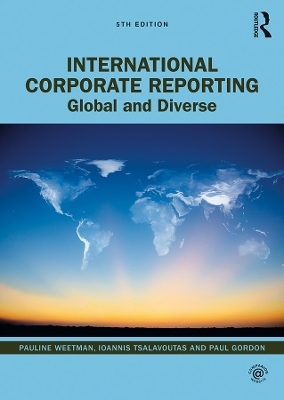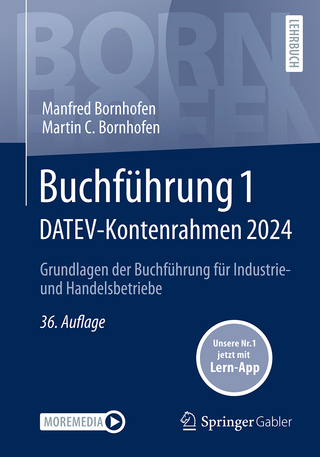
International Corporate Reporting
Routledge (Verlag)
978-1-138-36499-8 (ISBN)
This textbook provides a comprehensive overview of international corporate reporting which enhances students’ understanding of diversity and convergence in the field.
The authors discuss the institutional and cultural context in which international corporate reporting has developed over the years as well as the global reach of IFRS Standards from the IASB throughout and beyond the European Union, into interest groups and emerging economies. Other key elements explored throughout the book include assurance through auditing and corporate governance, narrative reporting, strategic and corporate social responsibility, group accounting, current accounting issues and taxation in corporate reports. Indicative research examples show how the methods used in research papers may be understood and applied. Case studies outline short projects based on corporate cases, with related links to material on corporate websites. Helpful and reliable sources of information and data are identified through hyperlinks to accessible websites. End-of-chapter questions encourage discussion of the main issues. Throughout there is a focus on accountability and the information needs of stakeholders.
This new edition of a classic text is fully revised and updated in order to remain essential reading for students of international accounting and corporate reporting globally. The book will be an invaluable resource for postgraduate taught programmes and final-year undergraduate courses in accounting, finance and business studies.
Pauline Weetman is Professor Emerita in Accounting at the University of Edinburgh and holds the Distinguished Academic Award 2005 of the British Accounting and Finance Association. She is a co-editor of The Routledge Companion to Accounting in Emerging Economies. Ioannis Tsalavoutas is Professor of Accounting and Finance at the University of Glasgow and holds a PhD in Accounting from the University of Edinburgh. His research on financial accounting and reporting has featured in leading journals. He is a co-editor of The Routledge Companion to Accounting in Emerging Economies. Paul Gordon is a lecturer in accounting and finance at Heriot-Watt University, having previously held positions at Glasgow, Aberdeen and Bangor. His teaching interests include international accounting and financial analysis.
List of exhibits and case studies
Author biographies
Preface
Acknowledgements
Part I Institutions, culture and research methods
Chapter 1 Global corporate reporting
Learning outcomes
1.1 Current trends in global corporate reporting
1.2 Overview of corporate reporting
1.3 Our approach in this book
1.4 The language we use
1.5 Establishing global authority in corporate reporting
1.6 Challenging globalisation
1.7 Summary and key points
Questions
References
Chapter 2 Institutional and external influences
Learning outcomes
2.1 Introduction
2.2 Factors influencing the development of accounting systems
2.3 The political and economic system
2.4 The legal system
2.5 The taxation system
2.6 The corporate financing system
2.7 The accounting profession
2.8 Religious institutions
2.9 Other influences
2.10 Indicative research examples
2.11. Summary and key points
Questions
References
Chapter 3 Cultural influences
Learning outcomes
3.1 Introduction
3.2 Defining culture
3.3 Culture and business
3.4 Culture and accounting
3.5 Is culture an important influence on accounting?
3.6 Indicative research examples
3.7 Summary and key points
Questions
References
Chapter 4 Classification of accounting systems
Learning outcomes
4.1 Introduction
4.2 Reasons for classifying accounting systems
4.3 Deductive and inductive classification
4.4 Approaches to classification
4.5 Development of classification studies
4.6 Is classification successful?
4.7 Summary and key points
Questions
References
Chapter 5 Measuring harmonisation and diversity
Learning outcomes
5.1 Introduction
5.2 Similarities and differences in the accounting methods used
5.3 Good news, bad news and earnings ‘conservatism’
5.4 Similarities and differences in narrative disclosure
5.5 Summary and key points
Questions
References
Part II Global reach of international standards
Chapter 6 Developing international financial reporting standards
Learning outcomes
6.1 Introduction
6.2 Structure for setting IFRS Standards
6.3 Operation of the IASB
6.4 Challenges to the IASB
6.5 The International Federation of Accountants
6.6 Indicative research examples
6.7 Summary and key points
Questions
References
Chapter 7 European accounting and reporting
Learning outcomes
7.1 Introduction
7.2 European Union (EU)
7.3 Accounting in EU member states
7.4 National standard setters in Europe
7.5 European Securities Markets Authority (ESMA)
7.6 Indicative research examples
7.7 Summary and key points
Appendix to Chapter 7
Questions
References
Chapter 8 Global organisations and interest groups
Learning outcomes
8.1 Introduction
8.2 Political influence
8.3 Initiatives from the business community
8.4 Cooperation in the accountancy profession
8.5 Regional groups in the accountancy profession
8.6 Indicative research examples
8.7 Summary and key points
Questions
References
Chapter 9 Broadening the influence of IFRS Standards
Learning outcomes
9.1 Introduction
9.2 Differential reporting
9.3 Balancing national control with IFRS convergence
9.4 Public sector accounting standards
9.5 Indicative research examples
9.6 Summary and key points
Questions
References
Part III Assurance
Chapter 10 Auditing
Learning outcomes
10.1 Introduction
10.2 International Auditing and Assurance Standards Board
10.3 National monitoring and review of audit firms
10.4 Developing the audit report
10.5 Competition and audit reform
10.6 Indicative research examples
10.7 Summary and key points
Questions
References
Chapter 11 Corporate governance
Learning outcomes
11.1 Introduction
11.2 Organisation for Economic Cooperation and Development (OECD)
11.3 Corporate governance models
11.4 Corporate governance codes
11.5 Enforcement and ratings
11.6 Indicative research examples
11.7 Summary and key points
Questions
References
Part IV Narrative corporate reporting
Chapter 12 Management commentary and strategic reporting
Learning outcomes
12.1 Introduction
12.2 Management discussion and analysis in the US
12.3 Management reports through the EU Accounting Directive
12.4 IASB Management commentary
12.5 Remuneration reports
12.6 Dual listing and investor communication
12.7 The meaning of ‘transparency’
12.8 Indicative research examples
12.9 Summary and key points
Questions
References
Chapter 13 Corporate social responsibility and sustainability
Learning outcomes
13.1 Introduction
13.2 Initiatives supported by the United Nations
13.3 Governmental-backed strategies
13.4 Global networks and interest groups
13.5 Market ratings
13.6 Is CSR reporting effective for sustainability?
13.7 Indicative research examples
13.8 Summary and key points
Questions
References
Part VI Accounting and taxation
Chapter 14 Group reporting
Learning outcomes
14.1 Introduction
14.2 Group accounting
14.3 Goodwill and impairment
14.4 Associates and joint ventures
14.5 Foreign currency and hyperinflation
14.6 Summary and key points
Questions
References
Chapter 15 Current issues in accounting
Learning outcomes
15.1 Introduction
15.2 Fair value accounting
15.3 Investment properties
15.4 Revenue recognition
15.5 Research and development expenditure
15.6 Leases
15.7 Alternative performance measures (non-GAAP reporting)
15.8 Indicative research examples
15.9 Summary and key points
Questions
References
Chapter 16 Corporate tax reporting
Learning outcomes
16.1 Introduction
16.2 Tax systems
16.3 IAS 12 Accounting for income taxes
16.4 Tax planning and transfer pricing
16.5 Country-by-country reporting
16.6 Indicative research examples
16.7 Summary and key points
Questions
References
Part VI National interests in an environment of global reporting
Chapter 17 United States
Learning outcomes
17.1 Introduction
17.2 Institutional and external influences
17.3 Development of accounting regulation
17.4 The corporate reporting system
17.5 Auditing and corporate governance
17.6 Indicative research examples
17.7 Summary and key points
Questions
References
Chapter 18 China
Learning outcomes
18.1 Introduction
18.2 Institutions
18.3 Development of accounting regulation
18.4 Corporate reporting framework
18.5 Auditing and corporate governance
18.6 Hong Kong
18.7 Indicative research examples
Questions
References
Chapter 19 Japan
Learning outcomes
19.1 Introduction
19.2 Institutions
19.3 External influences on accounting
19.4 Development of accounting regulation
19.5 The corporate reporting system
19.6 Auditing and corporate governance
19.7 Indicative research examples
19.8 Summary and key points
Questions
References
Index
| Erscheinungsdatum | 12.03.2020 |
|---|---|
| Zusatzinfo | 46 Tables, color; 6 Line drawings, color; 6 Illustrations, color |
| Verlagsort | London |
| Sprache | englisch |
| Maße | 174 x 246 mm |
| Gewicht | 890 g |
| Themenwelt | Wirtschaft ► Betriebswirtschaft / Management ► Rechnungswesen / Bilanzen |
| ISBN-10 | 1-138-36499-1 / 1138364991 |
| ISBN-13 | 978-1-138-36499-8 / 9781138364998 |
| Zustand | Neuware |
| Informationen gemäß Produktsicherheitsverordnung (GPSR) | |
| Haben Sie eine Frage zum Produkt? |
aus dem Bereich


